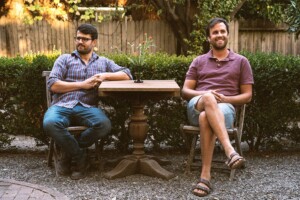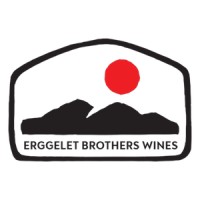Erggelet Brothers

Julian & Sebastian Erggelet
About
Owners & winemakers: Julian & Sebastian Erggelet
Vineyards: 5 acres of estate vineyards in Brentwood, plus purchasing fruit from the Cecchini Family Vineyard and the Del Barba Vineyard
Vineyard management: The estate vineyard is certified organic, and purchased fruit is either certified or practicing organic
Soils: Varied by site, including Delhi sand and sandy loam
Grapes grown: Mataro, Carignane, Zinfandel, Grenache, Malvasia Bianca, Xarel-lo, Maccabeu, Petit Manseng
Annual production: 18,000 bottles
Quick facts:
- The Erggelet brothers are originally from Germany, but studied winemaking all over the world before falling in love with the old vines of Contra Costa County.
- The estate vineyard is a small portion of the 34-acre family farm run by Julian and his wife Alli, most of which is dedicated to stone fruit orchards, a mixed vegetable garden, and a flock of chickens and ducks.
- For more about Contra Costa’s historic vineyards and the new generation working to preserve them (including the Erggelets), check out this feature in Wine & Spirits Magazine.
Contra Costa County remains one of the hidden gems of California wine. Located just inland from San Francisco, at the delta of the Sacramento and San Joaquin rivers, the area was settled at the end of the 19th century by Italian, Portuguese, and Spanish immigrants who established vineyards with native grapes from their home countries in the dunes along the delta. Many of these plantings are still in production today at well over 100 years old. It was this treasure trove of old vineyards that captured the imagination of Julian and Sebastian Erggelet. Originally from Germany, the two brothers studied winemaking and pursued jobs that took them from the Mosel, to Burgundy, to Australia, and then to Napa Valley. It was while working in California that they discovered Contra Costa, and they were hooked. “Seeing the challenge of an abundance of centennial vineyards, grapes of the highest quality and a social web built on tradition, biscotti and diesel, we committed to putting Contra Costa on the map for fine wine in 2016 and have been learning ever since,” the brothers tell us.
The region is both a demanding and a fascinating place to make wine: “The challenges and perks go hand in hand – blazing sun, stoic vineyards, howling winds,” as Julian puts it. The sandy soil of the dunes is low in moisture and often high in temperature, making it inhospitable to pests, most notably phylloxera. This has allowed the old vineyards to thrive well into their second century, a rarity anywhere in the world. The main threat these days is urban sprawl, as the Bay Area continues to grow and open space is at a premium. “There is a small network of relatively isolated and traditional farming families safeguarding these vineyards,” Julian explains. “We’ve been on a mission to create a more robust economic foundation to keep these vineyards in production by elevating the market price and telling the story to a broader audience.”
Winemaking is simple and straightforward: “We keep the distance short, the floors clean and the beer cool,” Julian jokes. They work slowly and meticulously, relying on indigenous fermentations and using minimal SO2 to express the quality of the fruit and the terroir as reliably and purely as possible. “I feel like the approach to our wines is carried by our experience as winemakers taking on a rustic California outpost and bringing it to the fine wine world,” Julian tells us. “The wines are concise, very true to varietal, and a window into old California without the dogma and jeunesse.”

